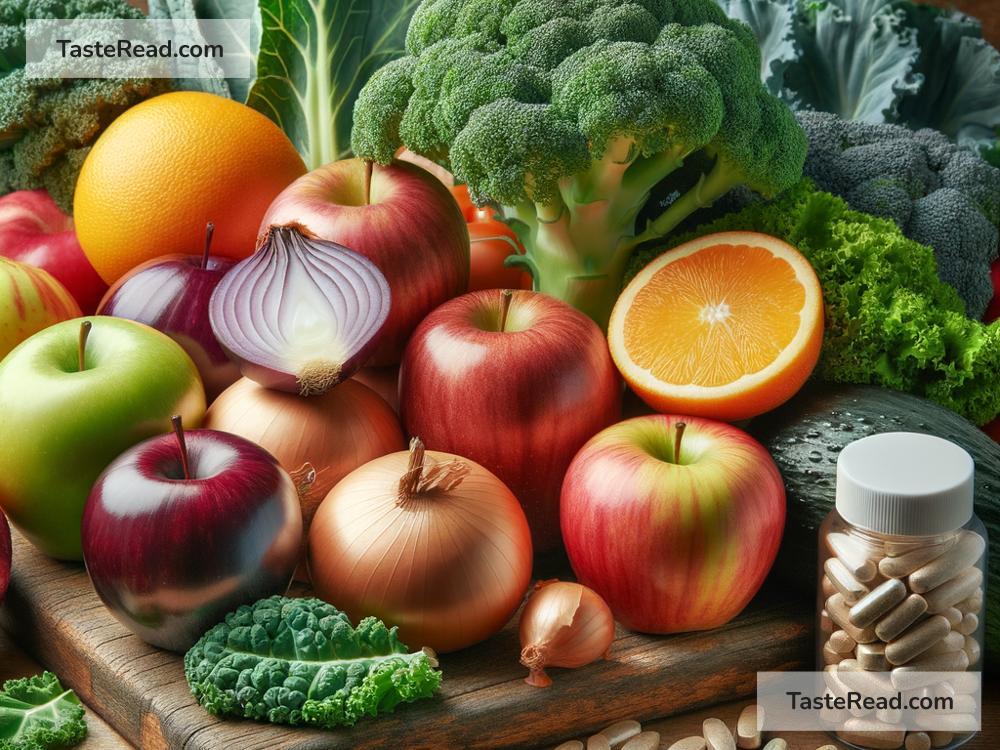Understanding the Role of Quercetin in Health: Nature’s Secret Ingredient
Have you ever heard of quercetin? It may sound complex, but it’s actually a simple, natural compound found in many of the foods we eat every day. If you enjoy apples, onions, berries, or even a cup of green tea, you’re already consuming quercetin! This little-known substance might hold big potential for improving your health, and today, we’ll break it down in easy-to-understand terms.
What Is Quercetin?
Quercetin (pronounced “kwer-seh-tin”) is a type of plant nutrient called a flavonoid. Flavonoids are compounds that give fruits and vegetables their vibrant colors, such as the deep red of apples or the bright yellow of peppers. Beyond making food look good, flavonoids help protect plants from stress caused by the environment, such as harmful ultraviolet rays from the sun or damaging insects.
But the magic of quercetin doesn’t stop with plants. When we consume foods rich in quercetin, our bodies benefit too. It acts as an antioxidant, which means it helps combat oxidative stress—a process where harmful molecules called free radicals try to damage our cells. Over time, oxidative stress can lead to aging, inflammation, and even chronic diseases. That’s why antioxidants, like quercetin, are considered helpful in promoting good health.
Where Can We Find Quercetin?
Quercetin is widespread in nature and can be found in many fruits, vegetables, and drinks. Common sources of quercetin include:
- Apples: Especially in the skin.
- Onions: Red and yellow onions have high amounts.
- Berries: Blueberries, cranberries, and blackberries are rich sources.
- Leafy greens: Kale, spinach, and broccoli contain quercetin.
- Herbs: Dill, cilantro, and parsley.
- Tea: Green tea and black tea also contain quercetin.
In addition to food, quercetin is available in dietary supplements. But for most people, getting it naturally through a balanced diet is the best option.
How Does Quercetin Promote Health?
Quercetin’s power comes from its various health-promoting benefits. While research into quercetin is still ongoing, studies have shown some promising results. Here are some key ways quercetin may support your health:
1. Fighting Inflammation
Inflammation happens when your body fights off invaders, like bacteria, viruses, or injuries. While short-term inflammation is helpful, long-term (or chronic) inflammation can damage your tissues and lead to diseases like arthritis, heart problems, or diabetes. Quercetin’s anti-inflammatory properties may help calm down chronic inflammation.
2. Boosting Immunity
Your immune system is your body’s defense system, protecting you against illnesses. Quercetin has been studied for its potential to strengthen the immune system and help fight infections. Some studies suggest it could be especially helpful during flu season or times of increased stress.
3. Improving Heart Health
Quercetin may also play a role in keeping your heart healthy. It’s believed to support better blood flow by relaxing blood vessels and reducing high blood pressure. In addition, quercetin may improve cholesterol levels by lowering “bad” LDL cholesterol, which can clog arteries and increase the risk of heart disease.
4. Helping with Allergies
If you suffer from seasonal allergies, quercetin may bring some relief. It’s thought to act as a natural antihistamine, blocking the release of histamines that trigger allergy symptoms like sneezing, itching, or runny noses.
5. Protecting Against Chronic Diseases
Scientists are investigating quercetin’s role in reducing the risk of several chronic diseases, such as diabetes, cancer, and neurodegenerative conditions, like Alzheimer’s disease. While more research is needed, early studies show quercetin’s ability to reduce oxidative stress and inflammation may play a key role in prevention.
How Much Quercetin Do You Need?
There isn’t a specific daily requirement for quercetin, but studies suggest that eating a diet rich in fruits and vegetables naturally provides a healthy amount. For example, eating one medium-sized apple, a cup of spinach, or a handful of berries can help increase your quercetin intake. For people looking for extra support, quercetin supplements are available. However, it’s always wise to consult a healthcare provider before starting any new supplement.
Are There Any Risks?
Quercetin from food sources is considered very safe, but supplements could pose risks in high doses. Some people might experience side effects like stomach upset or headaches. Additionally, quercetin supplements may interact with certain medications, so it’s important to discuss them with your doctor.
A Natural Boost for Health
While quercetin isn’t a miracle cure, it’s definitely a natural ingredient worth paying attention to. Including more quercetin-rich foods in your diet is an easy and delicious way to support your overall health. By eating a colorful variety of fruits, vegetables, and other quercetin sources, you’ll not only enjoy great flavors but also provide your body with the nutrients it needs to thrive.
So, next time you bite into an apple or chop an onion for dinner, remember—you’re treating your body to a dose of quercetin. Small, everyday choices like these add up to long-term benefits. Nature truly has some amazing secrets, and quercetin is one of them!


